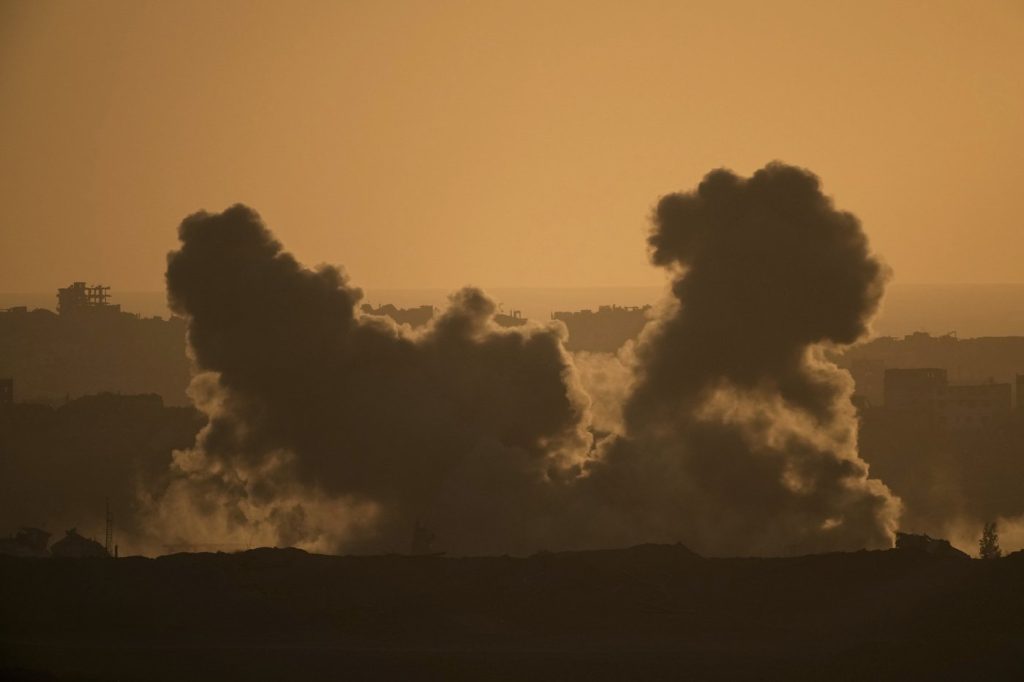DEIR AL-BALAH, Gaza Strip (AP) — Recent Israeli airstrikes in the Gaza Strip have resulted in at least 40 Palestinian deaths, according to hospital officials on Wednesday. This comes as international mediators are rushing to finalize a ceasefire agreement amid the ongoing conflict.
Israeli Prime Minister Benjamin Netanyahu held a second meeting with U.S. President Donald Trump at the White House on Tuesday evening. Trump is advocating for a ceasefire that could potentially end the 21-month war in Gaza. Both Israel and Hamas are examining a new U.S.-backed ceasefire proposal aimed at pausing the conflict, releasing Israeli hostages, and facilitating vital aid into Gaza.
Nasser Hospital, located in the southern city of Khan Younis, reported that among the casualties were 17 women and 10 children. A single airstrike reportedly killed 10 members of the same family, including three children.
Though the Israeli military refrained from commenting on individual strikes, it confirmed that over 100 targets across Gaza were hit in the last day, including militants, booby-trapped buildings, arms storage facilities, missile launchers, and tunnels. Israel accuses Hamas of concealing weapons and combatants within civilian populations.
As the ceasefire negotiations unfold, many Palestinians inhabit the sprawling coastal Muwasi area in makeshift tents, having been displaced from their homes. Abeer al-Najjar expressed her struggles during the relentless bombardments, struggling to provide sufficient food and water for her family. She expressed a deep desire for a lasting ceasefire, stating, "I pray to God that there would be a pause, and not just a pause where they would lie to us with a month or two, then start doing what they’re doing to us again. We want a full ceasefire."
Ali al-Najjar, Abeer’s husband, highlighted the severe challenges faced during the summer, particularly the lack of access to drinking water in the oppressive heat. He remarked, "We hope this would be the end of our suffering and we can rebuild our country again," while hastily rushing through a crowd with two buckets to fill from a water truck.
Amani Abu-Omar lamented that the water truck only arrives every four days, insufficient for her dehydrated children. She expressed her fears of unmet expectations regarding ceasefires, saying, "We had expected ceasefires on many occasions, but it was for nothing."
The war began after Hamas's attack on Israel on October 7, 2023, which resulted in the deaths of around 1,200 Israelis and the taking of 251 hostages. While most hostages have been released during previous ceasefires, Israel's operations in Gaza have led to over 57,000 Palestinian deaths, predominantly women and children, as reported by Gaza’s Health Ministry.
Gaza’s Health Ministry, under the control of Hamas, does not distinguish between civilians and combatants. However, the U.N. and various international organizations regard its statistics as the most reliable concerning war casualties.
Following their meeting, Netanyahu indicated to reporters that he and Trump share a mutual understanding regarding the necessity to dismantle Hamas. He mentioned that the current cooperation and coordination between Israel and the U.S. is at an all-time high throughout Israel’s 77-year history.
This week, Trump’s Middle East envoy, Steve Witkoff, is set to travel to Doha, Qatar, to continue indirect negotiations with Hamas concerning the ceasefire proposal. Witkoff revealed late Tuesday that three significant areas of disagreement had been resolved; however, one crucial issue remains unresolved, although specifics were not disclosed.
Netanyahu also remarked on the "great victory" over Iran achieved through Israeli and American strikes during a recent 12-day war concluding two weeks ago. He stated that these developments open opportunities for expanding peace and further advancing the Abraham Accords, which involve normalization agreements between Israel and several Arab nations, facilitated by Trump in his initial presidential term. The U.S. has been actively pursuing normalization between Saudi Arabia and Israel.











